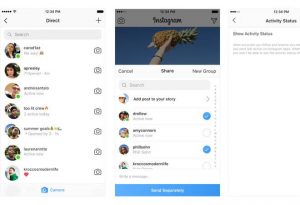
Your favourite photo-sharing app, owned by Facebook is rolled out a new feature on July 19.I t will highlight users who are currently online in the direct messaging box. Instagram now introduced a new feature where a green dot next to a user’s name which will indicate that she/he is currently online on the app and may available for text messaging. Before the company displayed an ‘active today’ status under the name. After all introducing of green highlight dot will provide a real-time update.
The official Instagram blog stated, “When your friends are active on Instagram, you’ll see a green dot next to their profile picture in various spaces within the app, including the Direct inbox and your friend list when you share a post from the feed. You will only see the status of friends who follow you or people who you have talked to in Direct. You can easily hide your own status and turn off the ability to see when your friends are active in your settings.”

Not everyone can see whether a user is online or not. Only the followers with whom a user has exchanged direct messages will be able to see the ‘active now’ status, and vice-versa. As this feature is already present in Facebook and WhatsApp and the same feature incorporated into Instagram, all three popular social media platforms have fitted with the same feature.
For those who don’t want to display their status the app is providing an option to turn off the feature by going to the settings. In order to do so, users have to go to settings and scroll down to the ‘show activity status’ option. By switching this off, people will no longer be able to see a user’s online status. However, when the feature is disabled, the user won’t be able to see other’s status either.
At the same time, Facebook has undergone a change in policy, along with Instagram have begun to crack down on underage users. The company will now suspend accounts of users who are suspected of being under the minimum age of 13. The age is mandated by the US Child Online Privacy Protection Act who are minimum of 13 years, which necessitates that digital companies obtain parental consent before collecting data about children.
Source: BusinessToday
